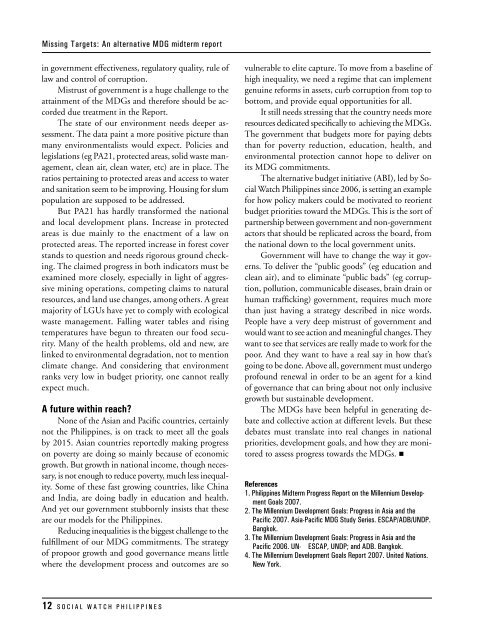one big file - Social Watch
one big file - Social Watch
one big file - Social Watch
You also want an ePaper? Increase the reach of your titles
YUMPU automatically turns print PDFs into web optimized ePapers that Google loves.
Missing Targets: An alternative MDG midterm report<br />
in government effectiveness, regulatory quality, rule of<br />
law and control of corruption.<br />
Mistrust of government is a huge challenge to the<br />
attainment of the MDGs and therefore should be accorded<br />
due treatment in the Report.<br />
The state of our environment needs deeper assessment.<br />
The data paint a more positive picture than<br />
many environmentalists would expect. Policies and<br />
legislations (eg PA21, protected areas, solid waste management,<br />
clean air, clean water, etc) are in place. The<br />
ratios pertaining to protected areas and access to water<br />
and sanitation seem to be improving. Housing for slum<br />
population are supposed to be addressed.<br />
But PA21 has hardly transformed the national<br />
and local development plans. Increase in protected<br />
areas is due mainly to the enactment of a law on<br />
protected areas. The reported increase in forest cover<br />
stands to question and needs rigorous ground checking.<br />
The claimed progress in both indicators must be<br />
examined more closely, especially in light of aggressive<br />
mining operations, competing claims to natural<br />
resources, and land use changes, among others. A great<br />
majority of LGUs have yet to comply with ecological<br />
waste management. Falling water tables and rising<br />
temperatures have begun to threaten our food security.<br />
Many of the health problems, old and new, are<br />
linked to environmental degradation, not to mention<br />
climate change. And considering that environment<br />
ranks very low in budget priority, <strong>one</strong> cannot really<br />
expect much.<br />
A future within reach<br />
N<strong>one</strong> of the Asian and Pacific countries, certainly<br />
not the Philippines, is on track to meet all the goals<br />
by 2015. Asian countries reportedly making progress<br />
on poverty are doing so mainly because of economic<br />
growth. But growth in national income, though necessary,<br />
is not enough to reduce poverty, much less inequality.<br />
Some of these fast growing countries, like China<br />
and India, are doing badly in education and health.<br />
And yet our government stubbornly insists that these<br />
are our models for the Philippines.<br />
Reducing inequalities is the <strong>big</strong>gest challenge to the<br />
fulfillment of our MDG commitments. The strategy<br />
of propoor growth and good governance means little<br />
where the development process and outcomes are so<br />
vulnerable to elite capture. To move from a baseline of<br />
high inequality, we need a regime that can implement<br />
genuine reforms in assets, curb corruption from top to<br />
bottom, and provide equal opportunities for all.<br />
It still needs stressing that the country needs more<br />
resources dedicated specifically to achieving the MDGs.<br />
The government that budgets more for paying debts<br />
than for poverty reduction, education, health, and<br />
environmental protection cannot hope to deliver on<br />
its MDG commitments.<br />
The alternative budget initiative (ABI), led by <strong>Social</strong><br />
<strong>Watch</strong> Philippines since 2006, is setting an example<br />
for how policy makers could be motivated to reorient<br />
budget priorities toward the MDGs. This is the sort of<br />
partnership between government and non-government<br />
actors that should be replicated across the board, from<br />
the national down to the local government units.<br />
Government will have to change the way it governs.<br />
To deliver the “public goods” (eg education and<br />
clean air), and to eliminate “public bads” (eg corruption,<br />
pollution, communicable diseases, brain drain or<br />
human trafficking) government, requires much more<br />
than just having a strategy described in nice words.<br />
People have a very deep mistrust of government and<br />
would want to see action and meaningful changes. They<br />
want to see that services are really made to work for the<br />
poor. And they want to have a real say in how that’s<br />
going to be d<strong>one</strong>. Above all, government must undergo<br />
profound renewal in order to be an agent for a kind<br />
of governance that can bring about not only inclusive<br />
growth but sustainable development.<br />
The MDGs have been helpful in generating debate<br />
and collective action at different levels. But these<br />
debates must translate into real changes in national<br />
priorities, development goals, and how they are monitored<br />
to assess progress towards the MDGs. •<br />
References<br />
1. Philippines Midterm Progress Report on the Millennium Development<br />
Goals 2007.<br />
2. The Millennium Development Goals: Progress in Asia and the<br />
Pacific 2007. Asia-Pacific MDG Study Series. ESCAP/ADB/UNDP.<br />
Bangkok.<br />
3. The Millennium Development Goals: Progress in Asia and the<br />
Pacific 2006. UN- ESCAP, UNDP; and ADB. Bangkok.<br />
4. The Millennium Development Goals Report 2007. United Nations.<br />
New York.<br />
12 S O C I A L W A T C H P H I L I P P I N E S

















